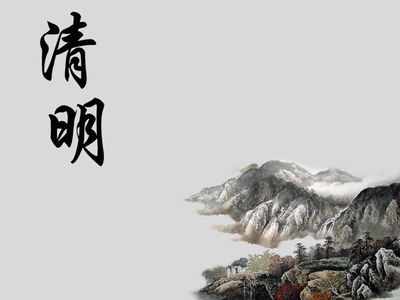Tomb-sweeping Day
春至清明,祭先祖,会旧友,忆故人,思己身。
Dialogue 1
Mark: Jingjing, are you all set to go on your trip?
马克:京晶,你都准备好开始你的旅行了吗?
Jingjing: That isn't until next week, after the holiday.
京晶:那是下周的事,节后了。
Mark: Oh yeah, we have a couple days off. Do you have to work on the weekend?
马克:哦,是吗?我们有几天假,你周末还得工作吗?
Jingjing: No, I have four days off in a row. I'm going to use it to get some work done early, and spend one of the days with friends or relatives here in Beijing.
京晶:不了,连下来我总共有四天假期。我要用它来提前完成一些工作,然后花一天时间和在北京的朋友、亲戚们聚聚。
Mark: Do you have any ancestors here?
马克:这里有你的先人吗?
Jingjing: Well, a cousin of mine is married to a Beijing native. We might get asked to come along to honor their grandparents who have passed on. Most likely, we'll meet them after they've taken care of that, though.
京晶:我的一位表姐嫁给了北京当地人,他们可能会叫上我们一起去给他家过世的祖父母祭奠。最可能的是,他们完事以后我们再见面。
Mark: Have you ever burned spirit money or joss paper on the street?
马克:你曾经在街上烧过纸钱吗?
Jingjing: No, I haven't. I understand why people do that. But I try to get back to my home town at least once a year, so I can visit the actual resting place of my relatives.
京晶:没有。我理解人们为何那样做。但是我尽量每年回家乡一次,这样我就能去亲自前去亲人们的安息之地了。
Mark: Do you usually go there with your mom and dad?
马克:你通常会跟着父母同去吗?
Jingjing: Yes, we walk up the hill to the burial site together. If any other relatives are in town, they come too.
京晶:是的,我们一起爬上山去墓地。如果还有其他亲戚也在,他们也会一起来。
Mark: That sounds like a good way to spend a morning together with members of your family.
马克:听上去是一个不错的和家人一起共度上午的方式。
Jingjing: Yeah, I usually enjoy it, even though it's not fun per se. It takes me back to childhood: the smell of incense, carrying bags for the older people that are with me, all that stuff.
京晶:是的,我很喜欢。虽然这本身并非是相聚来玩的。但这总把我带回童年:香火的气味,替同行的长辈们拎着包,诸如此类。
Mark: The ceremony hasn't changed, I imagine.
马克:祭奠的仪式一直以来都没有改变过吧,我猜。
Jingjing: Not really. Let's talk about it more next time.
京晶:没有。下次我们多聊几句。
New words: 习语短语
all set 准备好了
ready
ancestors 先人,先祖
relatives older than parents, no longer alive
passed on 过世的
no longer living
spirit money 纸钱
a kind of "play money" burned as an offering to the dead
joss paper 纸钱
paper made for burning, with a special smell
resting place 墓地
grave or other burial site
per se 本身 本质上
exactly
takes me back to 令我想起…
makes me remember, makes me miss old times
incense 香
sticks made for burning, with a special smell

Dialogue 2
Mark: So, Jingjing, are you ready to have some days off?
马克:那,京晶,准备好休息几天了吗?
Jingjing: You bet! I like working, but I definitely like having some time to myself.
京晶:那是当然!我喜欢工作,但是我当然也喜欢留点时间给自己。
Mark: Is there anything special that you do on the Qingming weekend—if you don't go back to your home town?
马克:清明这个周末你会做点什么特别的事吗?如果不回老家的话
Jingjing: Well, it's a great time to reflect on life.
京晶:这可是很好的能用来反思生活的时间了。
Mark: Do you get together with anyone?
马克:要和谁聚一聚吗?
Jingjing: If my relatives are in town, of course it's family time. If not, I see friends that have it like I do—away from family for work.
京晶:如果我的亲戚们都在一个城市的话,这当然是应与家人相处的时间。如果不在的话,就去见见那些和我一样为了工作离开亲人的朋友们。
Mark: It must be nice to catch up with people you haven't seen in a while.
马克:见到许久不见的人那种感觉一定很棒。
Jingjing: It really is. I remember in past years, there were a few times I stayed in Beijing, didn't have relatives with me, and called around to see who wanted to meet for lunch.
京晶:确实。我记得过去几年,有好几次我在北京,身边一个亲人也没有,我到处打电话找人出来吃午饭。
Mark: Do you have a regular group?
马克:你有经常能聚的朋友们吗?
Jingjing: Usually, yes. But with the holiday, my closest friends are sometimes tied up.
京晶:通常有的。但是节假日到来时,最亲近的朋友有时也忙得不可开交。
Mark: That's a good chance to see people you lost touch with.
马克:那就是个好机会去见见失去联系的人们。
Jingjing: Exactly. I try to gather four or five people, and sometimes end up having lunch with old friends who have two or three years' worth of stories for me.
京晶:的确。我尽量攒四五个人,有时候往往最后和那些两三年没见的朋友们相聚吃了饭。
Mark: It's a good time of year for it. Don't forget to send out those messages to see who's free.
马克:这当然是一年中适宜相见的时节了。别忘了发发信息看都谁有空。
Jingjing: For sure.
京晶:一定的。
New words: 习语短语
reflect 省察,沉思
think about something you have done, consider what to do differently in the future
tied up 繁忙的
busy












